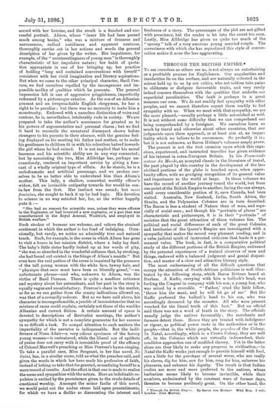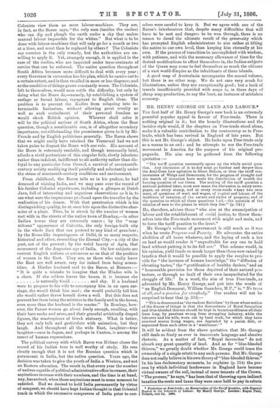THROUGH THE BRITISH EMPIRE.* To see ourselves as others see
us, is not always an entertaining or a profitable process for Englishmen. Our angularities and insnlarities lie on the surface, and are naturally reflected in the mirror held up to us by our critics, who not seldom take pains to obliterate or disfigure favourable traits, and very rarely indeed concern themselves with the qualities that underlie our superficial peculiarities. The fault is perhaps in a great measure our own. We do not readily feel sympathy with other peoples, and we cannot therefore expect them readily to feel sympathy with us. When we meet with that sympathy, we are the more pleased,—usually perhaps a little astonished as well. It is not without some difficulty that we can comprehend our being comprehended by a foreigner. We ourselves learn so much by travel and otherwise about other countries, that our judgments upon them approach, or at least aim at, an impar- tiality which we believe to be uncommon. So probably it is ; but it is not unknown, as Baron Hiibner's volumes amply prove.
The present is not the first occasion upon which this saga- cious, experienced, and instructed traveller has given evidence of his interest in extra-European Britain. In his Promenade autour du Monde, an accepted classic in the literature of travel, the part played by this country in the development of the less civilised portions of the globe is touched upon, when oppor- tunity offers, with no grudging recognition of its general value and importance to the world at large. In these volumes we have the record of another journey round the world, but from one point of the British Empire to another, facing the sun always, until every considerable portion of it, save Canada, had been visited. Australia, New Zealand, India, South Africa, the Straits, and the Polynesian Colonies are in turn described. The Baron is less a student of Nature than of man, and espe- cially of social man ; and though his "portraits of places" are characteristic and picturesque, it is in their " portraits " of societies that the great attraction of these volumes lies. The political and social differences of each of the great Colonies. and territories of the Queen's Empire are investigated with a sympathy that makes the record very pleasant reading, and in a calm judicial spirit of instructed criticism that lends it a per- manent value. The book, in fact, is a comparative political study of the different portions of the British Empire, enlivened by the personal experiences of a trained observer of men and things, endowed with a balanced judgment and genial disposi- tion, and master of a clear and attractive literary style.
The most embarrassing of all the difficult questions that occupy the attention of South-African politicians is well illus- trated by the following story, which Baron Hiibner heard at Durban. A Kaffir, carrying with him a bullock's head, was fording the Umgeni in company with his son, a young boy, who was seized by a crocodile. "'Father,' cried the little fellow, throw him the meat, and he will let go of me.' But the Kaffir preferred the bullock's head to his son, who was accordingly devoured by the monster. All who were present vouched for the literal truth of this fact." But an official said there was not a word of truth in the story. The officials usually judge the natives favourably ; the merchants and farmers detest them. Hence they are treated with indulgence or rigour, as political power vests in the authorities or in the people,—that is, the white people, the populus of the Colony. In Natal, accordingly, which is a Crown Colony, they are well off; in the Colonies which are virtually independent, their condition approaches one of modified slavery. Yet in the latter alone are they likely to make any progress in civilisation,—in Natal the Kaffir works just enough to provide himself with food, save a little for the purchase of several wives, who are really his slaves, dig for him, sow for him, reap for him, subserve his pleasures, and enhance his dignity. The result is that Indian coolies are more and more preferred to the natives, whose barbarism seems likely to become invincible, while their numbers, nndecimated by the constant wars of former days, threaten to become perilously great. On the other hand, the
• Through the British Empire. By Baron von Hillman With Map. 2 yobs. London : John Murray.
Colonists view them as mere labour-machines. They are, in fact, as the Baron says, "the only men (besides the coolies) who can dig and plough the earth under a sky that makes manual labour impossible for the whites." But what is to be done with labour-machines that will only go for a month or two at a time, and must then be replaced by others ? The Colonists say coercion is the only remedy, but the authorities are un- willing to apply it. Yet, strangely enough, it is applied in the case of the coolies, who are imported under term-contracts of service that can be enforced. The native question throughout South Africa becomes more difficult to deal with every year ; every Governor in succession has his plan, which he carries out to a certain extent, and is then recalled in more or less disgrace; and so the condition of things grows constantly worse. The Colonists, left to themselves, would soon settle the difficulty, but only by doing what the Boers do,—namely, by establishing a system of serfage or forced labour, repugnant to English ideas. The problem is to prevent the Kaffirs from relapsing into in- terminable barbarism, without allowing great cruelty as well as such curtailment of their personal freedom as would shock British opinion. Whoever shall solve it will be the political saviour of South Africa, where the Boer question, though a considerable one, is of altogether secondary importance, notwithstanding the prominence given to it by Mr. Fronde and by English politicians generally. The Baron shows that we might easily have retained the Transvaal had we not taken pains to disgust the Boers with our rule. His account of the Boers is extremely readable, and though necessarily brief, affords a vivid portraiture of this singular folk, slowly laborious rather than indolent, indifferent to all authority rather than dis- loyal to any particular form thereof, a survival of seventeenth- century society modifying itself painfully and reluctantly under the stress of nineteenth-century conditions and environment.
From childhood, the Baron tells us in his preface, be had dreamed of visiting India, and we may pass over the record of his further Colonial experiences, including a glimpse at Dutch Java, full of interesting and sagacious observations as it is, to see what were the impressions produced upon the traveller by the realisation of his dream. With that penetration which is his distinguishing quality, he at once hits upon the distinctive char- acter of a place. Thus, he is struck by the number of women met with in the streets of the native town of Bombay,—in other . Indian towns they are extremely scarce ; by the "mag- nificent" appearance of Calcutta, the only foreign-built city in the whole East that can pretend to any kind of grandeur ; by the Rome-like imposingness of Delhi, in so many respects, historical and other, resembling the Eternal City,—a city of the past, not of the present ; by the weird beauty of Agra, that monument of the Augustan age of India. On few subjects are current English notions so erroneous as on that of the position of women in the East. They are, as those who really know the East are well aware, very far indeed from being nonen- tities. A Hindoo husband said to the Baron, at Benares :— "It is quite a mistake to imagine that the Hindoo wife is a slave. If she seldom leaves the house, it is because she is naturally timid and shy. If a husband were to propose to his vife to accompany him in an open car- riage, she would think him mad ; she would probably tell him she would rather throw herself down a well. But this does not prevent her from being the mistress in the family and in the house, even more than the husband is the master." In Bombay, how- ever, the Parsee women go about freely enough, recalling, with their bare necks and arms, and their graceful artistically draped figures, the masterpieces of Greek statuary. What is better, they not only talk and gesticulate with animation, but they laugh. And throughout all the wide East, laughter—true laughter—save in Japan, and perhaps in Canton, is among the rarest of human expressions.
The political survey with which Baron von Hiibner closes the record of his Indian tour is well worthy of study. He sees clearly enough that it is not the Russian question which is paramount in India, but the native question. Years ago, the decision was taken to give the youth of India a Western, and not an Eastern education. The result is, that every year the number of natives capable of political administrative office increases, their aspirations increase with their numbers, and the time is at hand, nay, has arrived, when those aspirations must in some measure be satisfied. Had we desired to hold India permanently by virtue of conquest, we should have kept Indian thought in that Oriental track in which the successive conquerors of India prior to our-
selves were careful to keep it. But we agree with one of the Baron's interlocutors that, despite many difficulties that will have to be met and dangers to be won through, there is no reason to dread the ultimate result of the generosity which has prompted English administrators to aim rather at lifting the native to our own level, than keeping him eternally at his own. If the process of transition be accomplished with wisdom, with patience, and with the necessary allowance of timesfor the desired modifications to effect themselves in, the Indian subjects of the Queen may come to feel themselves as much the citizens of a vast world-Empire as the inhabitants of these islands.
A good map of Australasia accompanies the second volume, but there is no other map. We do not care very much for illustrations, unless they are exceptionally good ; but a book of travels insufficiently provided with maps is, in these days of cheap map-production, to say the least, an instance of mistaken economy.



































 Previous page
Previous page